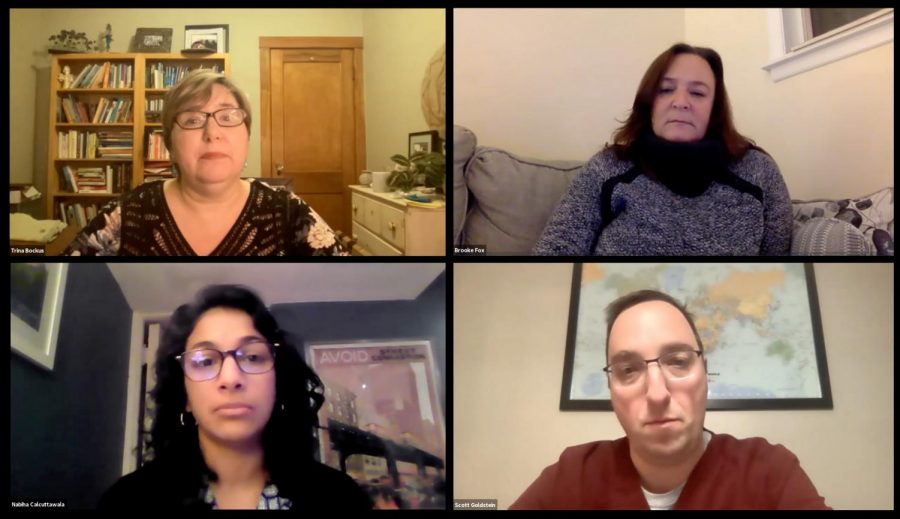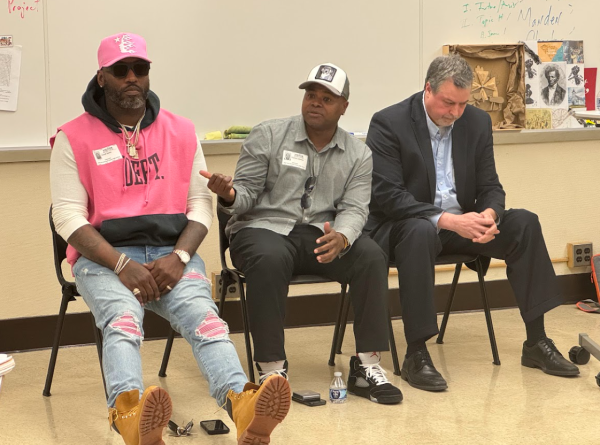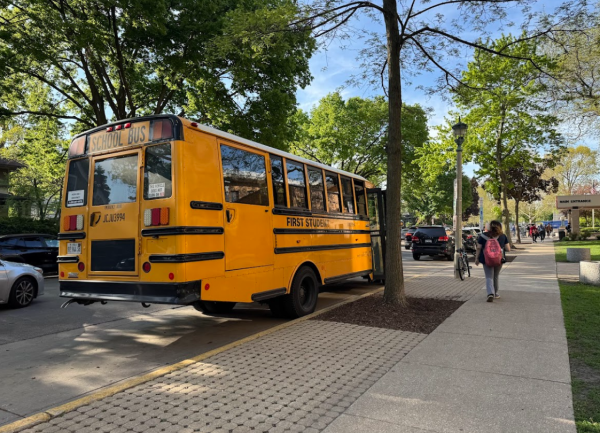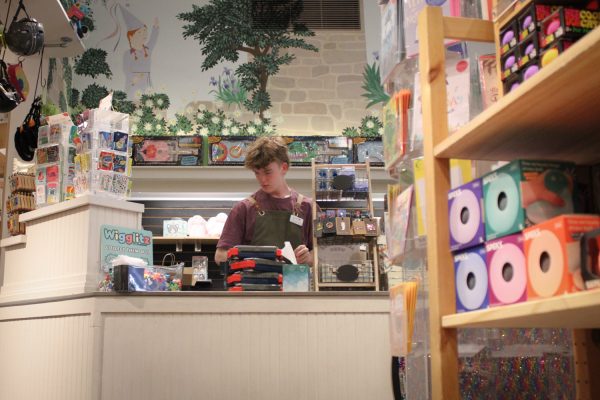Takeaways from mental health forum
On Jan. 21, the Trapeze Editorial Board hosted a Zoom forum exploring mental health and wellness in a pandemic.
The panel featured a range of medical professionals from the Oak Park and River Forest area, including Dr. Scott Goldstein, M.D, F.A.A.P; Trina Bockus; Nabiha Calcuttawala, LCSW (an OPRF social worker); and Brooke Fox, LCSW.
Questions from community members were submitted through a Google Form promoted across social media platforms by members of the Trapeze staff. Guests could also ask questions to the panelists directly. Here are the main takeaways from the forum as we return to normal life:
The closing of schools has dramatically affected the mental health of students. With online learning, students are often holed up in their rooms most of the day. Calcuttawalla said she has received a “concerning” number of phone calls and emails from worried parents.
The pandemic has caused a higher demand for social work services among students. When schools are forced to go remote, outside resources are important. Due to worsening signs and symptoms of mental health issues, panelists emphasized a higher demand for social work during the pandemic, and the importance of reaching out to students and community members extensively. However, Fox said mask-wearing has caused difficulties for both the student and social worker in communicating with each other through facial expressions. In this regard, Fox is thankful that the state provides TeleHealth services, allowing students and social workers to communicate virtually.
Organizations like the National Alliance on Mental Illness (NAMI), however, recognize some students are in need of in-person support and thus provide a combination of in-person and remote services, including family support groups and peer counseling.
Differences are stark in the mental health of students participating in hybrid vs. remote models. Many of the students Fox has seen who participate in fully remote school have felt a loss of purpose in sitting in their bedrooms all day. Socializing with classmates and teachers, albeit differently, through a hybrid model has given students greater confidence and ability to grow, providing a reassuring sense of purpose, Fox said.
Self-care is extremely important. Because students are doing everything from home, it’s difficult to get into a good routine. It helps to create a schedule that adds more structure to your day during breaks from online learning. For example, go outside and take a walk, read a book, or practice breathing exercises to clear your mind.
Relationships between social workers and students are important. Especially during a pandemic, students need to feel comfortable with who they are working with and be able to recognize when they feel uncomfortable with what their trusted adult has said. Students often are reluctant with what they want to share with social workers.
The ramifications of the pandemic have changed the ways people prioritize their needs. During the pandemic, people seem to be prioritizing their mental health first, going out when they feel it is safe. Doctors’ offices like Goldstein’s must stay open to ensure physical well-being of patients, but fear of the pandemic’s national surge has caused a loss in business. They must take extensive measures on COVID-19 safety to ensure patients feel safe during visits. For example, Dr. Goldstein’s office took the costly step of purchasing rapid COVID-19 tests for patients that detect results in as little as 15 minutes.
COVID-19 symptoms in teens are considerably less severe. Long story short, COVID does not impact teens as much medically as it does other populations. Doctors such as Goldstein are seeing worse symptoms of the flu in teens than COVID, and with the pandemic, a significant decrease in other illnesses like influenza and the common cold.
The pandemic has amplified sleep problems and decreased physical activity in teens especially. The long-term problem for teens during the pandemic is well-being, not COVID. We should do what we can to live active and structured lifestyles. Even when the pandemic is over, some will experience agoraphobia (fear of open spaces) and social awkwardness, burdening our ability to live in the moment during the most exciting time in our lives.
Though social media is easily addictive, it is the only way teens can socialize during a pandemic. Many of us find ourselves stuck in the same cycle during the pandemic, holed up in our bedrooms for 12 hours a day: school, homework, TikTok, repeat. Social media is addictive, Bockus said, but it defines our generation and is the only way for us to connect when our traditional lifestyles are shut down.
Teen brains are wired to socialize, and it can be difficult to resist socializing in unsafe ways during a pandemic. Though students might be tempted to join in on risky behaviors such as large, maskless gatherings, look for people willing to engage in COVID-safe social interactions. Even though our social lives are a large part of our personalities, we need to stay safe.
As teenagers, it can be hard to know how to advocate for ourselves. Sharing what you need with adults in your life is important. Teenagers are being asked to organize their schoolwork and plan for their futures the way most people do when they’re in college, and there’s a lot of assumption of personal responsibility on us.
Use your advisory space. We need to have that personal connection with teachers, and that is missed with everything being virtual. We must know we have allies, and it’s okay not to be okay. And if listening to the Daily Bulletin doesn’t interest or assist you, say something.
This isn’t the first pandemic there ever was, and it won’t be the last. While things may change for better or worse, it is going to go away. We can’t get too hung up on the short-term ramifications of the pandemic. Get off of Twitter and instead rely on two or three credible, unbiased news sources for information. Most importantly, don’t pay attention to statistics. Stay safe and focus on yourself.





